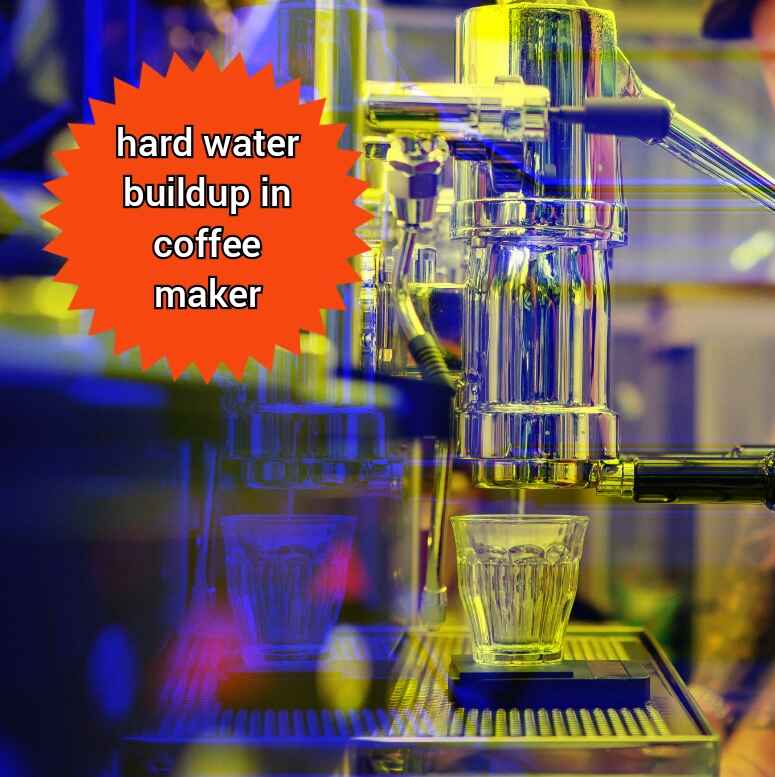Table of Contents
Introduction
Hardwater usage is very common in almost everyone’s house. So, every person thinks about the advantages and disadvantages of using hard water, and before finding hard water buildup in coffee maker, people must know about hard water. For that purpose, we wrote a detailed and comprehensive article on it. So, the reader will get complete information about hard water and its impact on your appliance, like a coffee maker.
Understanding hardwater
What is Hard water?
Water that contains high mineral content, like calcium and magnesium ions, is called hard water. These minerals are combined with water when it flows between rocks and soils, and after mixing with water, they cause hardness. It is not having the largest impact on human health, but it causes a major impact on your home appliance, like a coffee maker, when users go for hard water buildup in coffee maker.
Causes of hardwater
The main reason for a water harness is that it naturally percolates. What does it mean? When water percolates in a particular region where limestone and chalk are deposited, this allows calcium and magnesium ions to mix in the water, which increases the hardness level.
Hard water vs soft water
In order to find hard water buildup in coffee maker, you must know about the basic difference between ordinary water and hard water. So, the basic difference is given as…
| Hard water | Soft water |
| As we mentioned above, water with a rich content of calcium and magnesium ions is hard, and due to its hardness, it will damage the health of your appliance. Also, it is not used in daily food recipes because its hardness destroys the taste of your food. | Soft water means the ordinary water that we use in our daily routine. It is good for your health, and it will not have a bad impact on your home appliances. Also, it is used in daily food recipes, and the taste of your food and beverage is still as desired. |
How to test water hardness?
Before going hard water buildup in coffee maker, it is necessary to check the hardness level. It is very easy to test the level of water hardness in your home. You just have to purchase a test kit or strip. These kits contain chemical reagents, and when they react with hard water and produce different colors, that will indicate the hardness of the water.
You can check it with just soap, dissolve a little amount of soap or washing detergent, and mix it well. If bubbles rise a small amount, then it means the level of hardness is high.
If you are not satisfied with the above-mentioned methods, then we recommend sending a sample of water to a professional laboratory for more precise testing.
Effects of hard water
To find the consequences of hard water buildup in coffee maker, you must find its effect on your appliances and on your meals. For understanding that, we give some detail about its impact on taste, impact on appliances, and impact on human health, which is given as
Impact on beverage taste and quality
As we know, hard water contains impurities, and the taste of your beverage, like coffee, will definitely be affected because of these impurities. It is just because limescale and other minerals mix with the other ingredient that the drinker will experience a less enjoyable drink with an unwanted aroma.
Impact on appliances
Now, before going for hard water buildup in coffee maker, you must know how its hardness will damage the components of your appliance, especially the coffee maker. Hard water buildup in coffee maker can cause mineral deposition in it, which can damage the internal part of the coffee maker. Also, it will produce clogs in your appliance, which will reduce the overall efficiency of your coffee machine.
Impact on human health
Water with a small amount of calcium and magnesium ions is not harmful to human health. But water with an excessive number of impurities can have a negative impact on health. It will cause digestive problems; especially for children’s digestive systems, it is not suitable.
Importance of remove mineral deposits from a coffee maker
Proper maintenance is necessary to extend the lifespan of your appliance, and after hard water buildup in coffee maker, it is mandatory for the user to clean it properly. Otherwise, the appliance will get damaged and not be available for further use for the following reasons:
Hard water buildup in coffee maker can create a calcium-layer coating that acts as a layer of insulation, through which your machine has to work hard to heat water and reduce its efficiency.
Hard water buildup in coffee maker can cause clogs in internal parts like pipes and components. These kinds of appliances are not designed to tolerate these mineral depositions, which is why their efficiency decreases.
Identify the hard water buildup in coffee maker
How can you identify the signs of hard water deposition? So, in order to identify it, you must check out its symptoms after hard water buildup in coffee maker. So that you can take prompt action to address the problem and restore the ideal performance of your coffee machine.
Impurities decomposition
As we discussed above, hard water buildup in coffee maker causes impurity deposition. After building up hardwater, there is a white and off-white deposition called limescale deposition. These settling layers contain calcium components that damage the interior of the coffee maker.
Slow brewing
Due to the decomposition of limescale, the coffee maker takes more power and time to heat the beverage. This will cause a slow brewing process as well as increase the chances of clogging and tear on the interior components of the coffee maker.
Improper taste and aroma
The decomposition of impurities also affects the taste and aroma of your beverage. When users make their beverage in the coffee maker, where limescales settle, these impurities are mixed with the beverage. Hence, it creates a less tasty beverage with a bad aroma.
Preventing hard water buildup in coffee maker
Regular cleaning
For preventing your coffee maker from any kind of damage, you should proper clean your coffee maker from outside and specially inside. Until you make sure that there is no residue or decomposition left in your coffee maker, it is not only preventing your coffee maker from any kind of damage, but it is also a good practice to maintain the performance of your appliance.
Using filtered or softened water
After hard water buildup in coffee maker, you must wash it with soft, filtered water. It will help in wiping out all the hardwater impurities from your machine. Also, it will prevent the clogging and deposition of limescale in the interior part of the coffee maker.
Methods of removing hard water buildup in coffee maker
White vinegar
After washing with soap and water, put a mixture of vinegar and water in the machine, and then turn on the machine. It will brew all the vinegar in the coffee maker in around 30 minutes. If any impurities remain, then it will be cleaned by this vinegar brew method.
Baking soda
As with the above white vinegar method, baking soda is also a very effective method in which you add some baking soda to a reservoir after washing with soap and water, put warm water in the appliance, and run your machine for up to two cycles. After doing that, your appliance will be cleaned properly.
Lemon juice soak
As with the above two methods, lemon juice is also a workable method. It has naturally present, acidic components, which will remove all kinds of impurities in your coffee maker. Just brew lemon juice for around 15 to 30 minutes in the coffee maker.
Hydrogen peroxide
Another method of cleaning your coffee maker from hard water is to add hydrogen peroxide to some warm water and put it in your coffee maker. Then run your appliance. If your coffee maker is not clean and a calcium deposit is still present, repeat the procedure twice. When you see that impurity dissolve in hydrogen peroxide, rinse it. And after that, clean your machine with fresh water.
Another recommended article
how to make coffee from whole beans
how many amps does a coffee maker draw
Conclusion
In this article, our team gives a complete guide about hard water buildup in coffee maker and in this article, out team make sure that every reader who is curious about the effects of hard water in their beloved coffee maker will get the all-necessary knowledge. We hope that the reader will be satisfied after reading the whole article.

